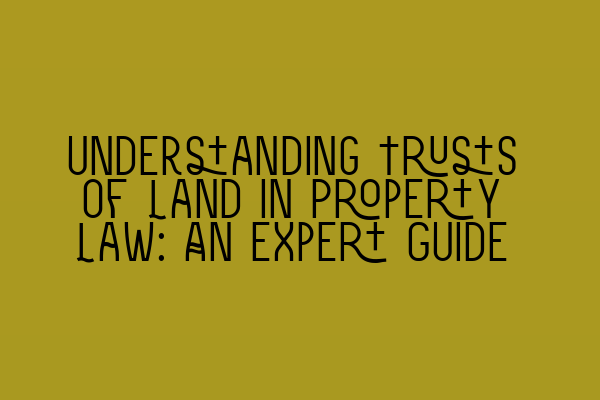Understanding Trusts of Land in Property Law: An Expert Guide
In property law, trusts of land play a crucial role in safeguarding the interests of multiple parties involved in the ownership and management of properties. However, understanding the complexities of trusts of land can be challenging for both legal professionals and individuals seeking to navigate this intricate area of property law.
In this expert guide, we will provide you with a comprehensive overview of trusts of land, explaining their purpose, types, key features, and legal implications. Whether you are studying for the SQE exams or simply looking to expand your knowledge in property law, this guide will equip you with the necessary understanding to work with trusts of land effectively.
What is a Trust of Land?
Put simply, a trust of land is a legal arrangement where the legal ownership and beneficial ownership of a property are separated. The property is held by one or more trustees for the benefit of one or more beneficiaries.
Trusts of land are commonly used in situations where multiple individuals have a shared interest in a property but want to legally protect their rights and ensure fair and equitable treatment. For example, trusts of land are frequently utilized in family situations, co-ownership of properties, and commercial ventures.
Types of Trusts of Land
There are two main types of trusts of land: express trusts and implied or resulting trusts.
1. Express Trusts:
Express trusts of land are created through an explicit agreement between the parties involved. The terms of the trust are clearly outlined in a written document, such as a trust deed or declaration of trust. This document establishes the intentions of the parties regarding the ownership and management of the property.
2. Implied or Resulting Trusts:
Implied or resulting trusts of land arise when the intentions of the parties are not explicitly documented but can be inferred from their actions and conduct. These trusts can be categorized into two subtypes:
a. Resulting Trusts:
Resulting trusts occur when the legal owner of the property holds it on trust for someone else. For example, if Person A purchases a property in their name but provides funds from both Person A and Person B, Person B may have a resulting trust interest in the property.
b. Constructive Trusts:
Constructive trusts are imposed by the court to correct any perceived unfairness or unjust enrichment. These trusts can arise in various circumstances, such as when one party relies on a promise or an assurance regarding the ownership of a property.
Key Features of Trusts of Land
Understanding the key features of trusts of land is essential for navigating the legal implications and obligations involved. Here are some important features to consider:
1. Trustees:
In a trust of land, the trustees hold the property’s legal title and are responsible for managing the property in accordance with the terms of the trust. Trustees have a fiduciary duty to act in the best interests of the beneficiaries and must exercise their powers prudently.
2. Beneficiaries:
The beneficial owners of the property, known as beneficiaries, hold equitable interests in the trust. They are entitled to the enjoyment and use of the property according to the terms of the trust. The beneficiaries may have different proportions of beneficial ownership.
3. Trustee Powers and Duties:
The trust deed or declaration of trust defines the powers and duties of the trustees. These powers may include decisions regarding the sale, leasing, mortgage, or alteration of the property. Trustees must act within the scope of their powers and in the best interests of the beneficiaries.
4. Trustee’s Right to Manage:
Trustees have the right to manage the property on behalf of the trust and the beneficiaries. However, in cases where there is disagreement or dispute between co-owners, one or more of the beneficiaries may apply for an order for sale to force the sale of the property.
Legal Implications of Trusts of Land
Trusts of land have significant legal implications that must be considered when dealing with property ownership and management. Some key legal implications include:
1. Trustee’s Duties:
Trustees owe fiduciary duties to the beneficiaries and must act in their best interests. This includes a duty of loyalty, good faith, and honesty in managing and dealing with the trust property.
2. Trustee’s Liability:
Trustees can be held personally liable for any breaches of their duties or negligent acts resulting in losses to the beneficiaries. It is crucial for trustees to have a comprehensive understanding of their obligations and seek legal advice when necessary.
3. Beneficiaries’ Entitlements:
Beneficiaries have the right to enforce their equitable interests in the trust property. They can apply to the court for various remedies, such as an order for sale, appointment of a new trustee, or an injunction to prevent unauthorized actions.
4. Co-ownership Disputes:
Trusts of land often arise in co-ownership situations where disputes can arise. Disagreements on factors like property management, contributions, or the disposal of the property can lead to disputes between co-owners. In such cases, legal advice is crucial to resolve conflicts effectively.
Conclusion
Understanding trusts of land in property law is vital for both legal professionals and individuals seeking to navigate property ownership and management effectively. This expert guide has provided you with a comprehensive overview of trusts of land, touching on their purpose, types, key features, and legal implications.
By grasping the concepts discussed in this guide, you will be better equipped to tackle property law cases involving trusts of land and ensure the protection of your clients’ interests. Whether you are studying for the SQE exams or seeking to expand your knowledge, trust law will prove to be a valuable area of expertise in the field of property law.
Related Articles:
– SQE 1 Practice Exam Questions
– SQE 1 Practice Mocks FLK1 FLK2
– SQE 2 Preparation Courses
– SQE 1 Preparation Courses
– SRA SQE Exam Dates
